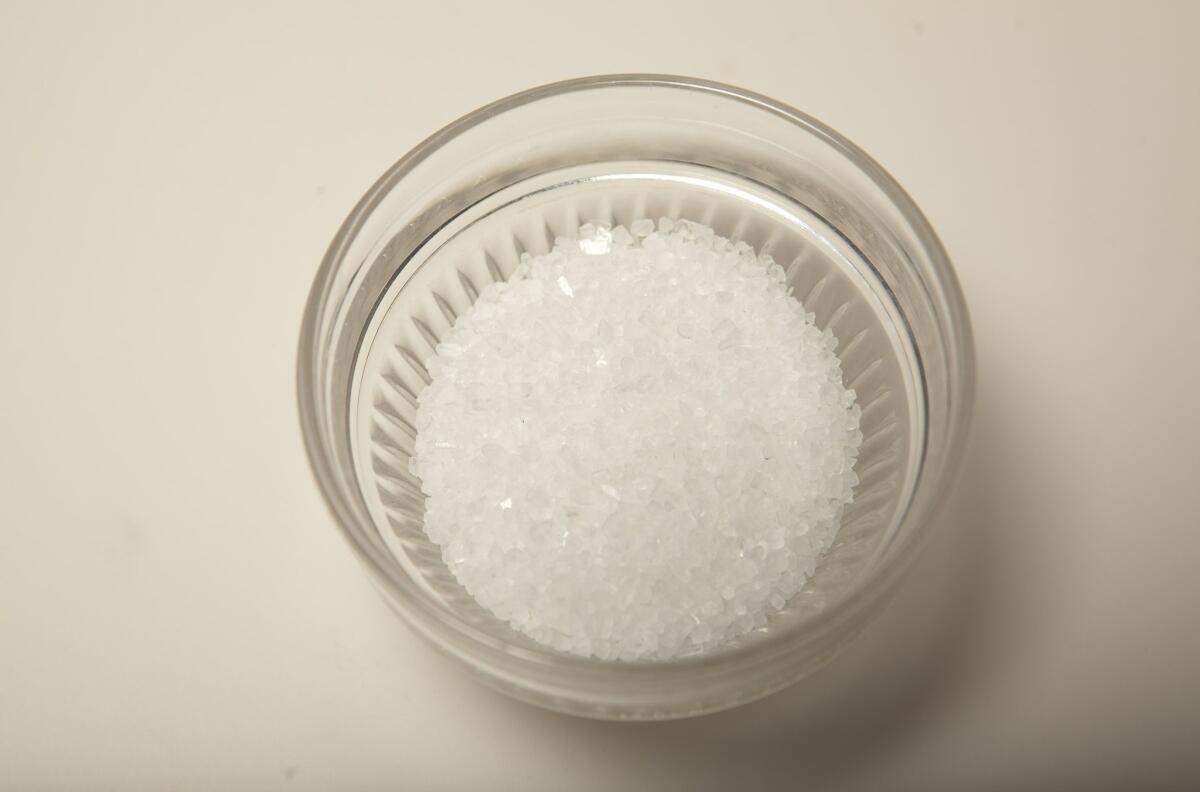Excess sodium intake linked to 1.65 million deaths annually

- Share via
Across the world, the excessive consumption of sodium--hiding in breads, soups and snack foods and beckoning from salt shakers everywhere--is the cause of some 1.65 million deaths by heart disease and strokes yearly, including roughly 667,000 “premature” deaths--those before the age of 70--says a comprehensive new study.
Globally, new research concludes that one in 10 cardiovascular deaths can be attributed to excessive sodium consumption, and one in five of those among people younger than 70.
The study, conducted by an international team led by Dr. Dariush Mozaffarian of Harvard University’s School of Public Health, was published Wednesday in the New England Journal of Medicine.
An invited editorial touted the study as a “herculean effort” to glean the effects of excess salt consumption in a broad population. But citing the findings of two studies published alongside the global assessment, University of Alabama vascular expert Dr. Suzanne Oparil declared it too early for public health officials to take up the cudgels against dietary sodium.
Daily sodium intake averaged 3.95 grams per day across the globe, and ranged upward to 5.15 grams, Mozaffarian’s team found. That level of consumption is well above the range that experts for the Institute of Medicine have concluded is ideal--as little as 1.5 grams per day for those with high blood pressure (as well as diabetics, African Americans and those 50 and older) and as much as 2.3 grams for all others.
Diets high in sodium claimed their highest tolls in a band stretching from the countries of Georgia and the Ukraine and across Central Asia to Russia, Mongolia and China, with slightly lower death rates throughout Asia, the study found. It was lowest in Central America and the Horn of Africa.
The United States, Canada and Europe, where public health campaigns aimed at reducing sodium in foods are already underway, lay roughly at the global midpoint, with just more than 300 deaths per million attributed to high sodium intake.
The study’s seemingly dramatic findings, however, belie continuing controversy over the value of efforts to reduce sodium intake across whole populations.
Among the points of contention is whether diets high in salt cause healthy people to develop high blood pressure or merely exacerbate the condition in those who have it. In contemplating measures to reduce the sodium content in everyday foods, public health officials are also wary of causing harm to patients, including those with heart failure, diabetes or chronic kidney disease, for whom a diet very low in sodium can cause complications and lead to death.
Clinical trials have demonstrated that subjects who reduced their sodium intake lowered their blood pressure. But despite extensive research, debate and efforts at expert consensus, the value of broad sodium-reduction campaigns--as well as the targets such campaigns should aim to reach--remain controversial.
A pair of studies published alongside the global assessment underscore the suspicion that, in broad populations, the relationship between sodium intake, hypertension, cardiovascular disease and death may be quite complicated.
One study published Wednesday found a tenuous connection between sodium intake and hypertension. A second study found that over a roughly 3 1/2 year period, those ingesting between 3 and 6 grams of sodium daily--a span that reflects the global range of sodium intake--were less likely to die or suffer a heart attack or stroke than were those who consumed diets higher or lower in sodium.
In addition, both studies suggested that for some, dietary intake of the mineral potassium may play a role in reducing excessive sodium’s ill effects.
The two studies appearing alongside the global assessment were conducted by researchers at McMaster University’s Population Health Research Institute in Ontario, Canada. Both measured, by indirect means, the sodium-intake levels of more than 100,000 people from at least 17 countries.
In the first of those studies, the link between levels of sodium intake and hypertension was most evident in older subjects, in those who had the highest sodium intake, and in subjects who had hypertension. But in people who fell outside of these groups, researchers found little discernible pattern: a diet that was moderately high in salt--just under 3 grams a day--was not clearly linked to high blood pressure in this study. And those consuming between 3 and 5 grams of sodium daily were only slightly more likely to have hypertension.
Those findings led Dr. Oparil, writing in the New England Journal of Medicine, to conclude that more study is needed before public health campaigns aimed specifically at reducing sodium intake can be safely launched.
The three articles “highlight the need to collect high-quality evidence on both the risks and the benefits of low-sodium diets,” Oparil wrote in an editorial published by NEJM Wednesday. Until clinical trials better flesh out the relationship among dietary sodium, potassium, hypertension and cardiovascular disease, she wrote, “the results argue against a reduction of dietary sodium as an isolated public health recommendation.”
That conclusion drew criticism from one public health expert who has worked with food manufacturing giants to reduce sodium content in widely-consumed processed foods.
“Given the very clear relation between sodium intake and higher blood pressure, and evidence that reducing intakes reduces risk of cardiovascular disease, I think the new findings do not change the basic conclusion that we should be moving toward lower sodium intakes,” said Dr. Walter Willett of Harvard University’s School of Public Health, who was not involved in any of the newly-published studies.
“The exact optimal intake is not clear. There is no question that some sodium is essential,” Willet added. As a result, he said, “while we move toward lower intakes, we should be conducting additional research to better define the optimal level.”




